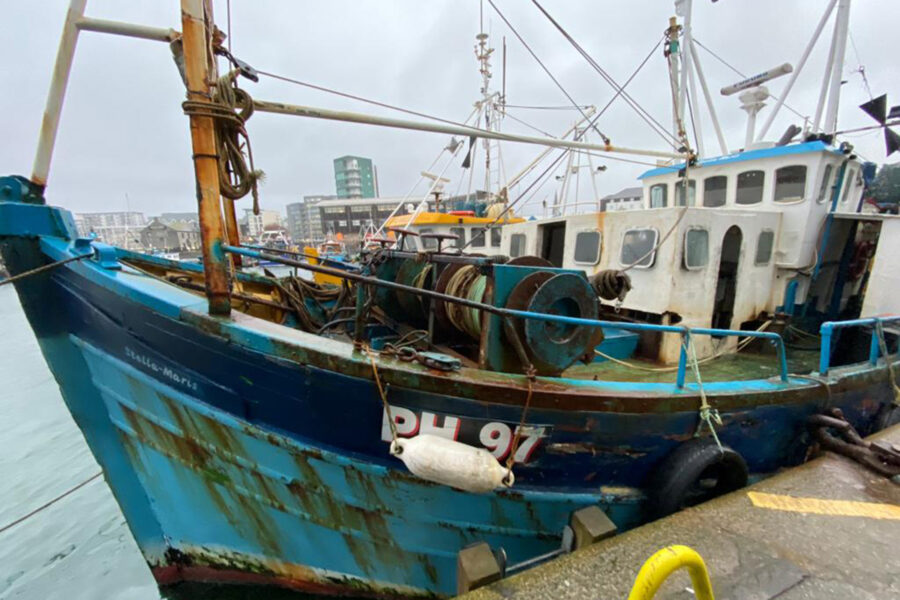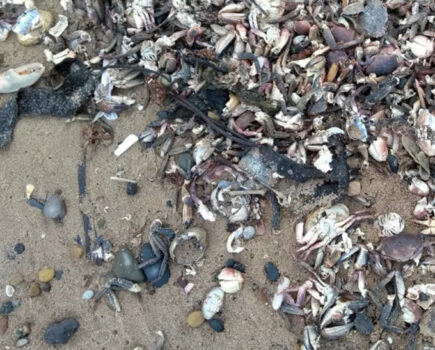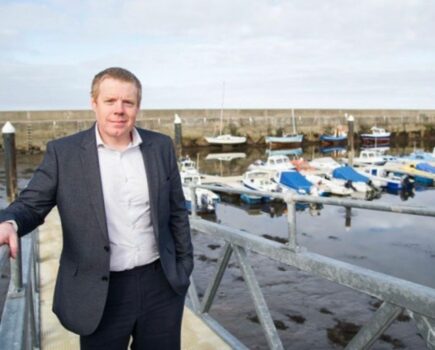Questions were being asked last week about the performance of Devon and Severn IFCA (D&SIFCA), and about the lack of consistency in enforcement within the six-mile zone throughout English waters, after a judge threw out a case brought by the IFCA after a six-year process, reports Andy Read.
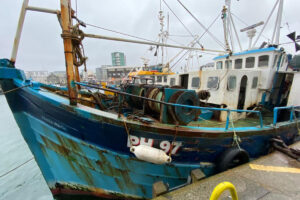
The Stella Maris was accused of multiple instances of illegal fishing within an MPA, on the basis of IVMS evidence alone. (Photo: Sarah Ready)
The fishermen in the case had been appealing against a 2018 magistrates’ decision that the vessel had been guilty of fishing within a Marine Protected Area, based solely on VMS data, without corroborating evidence.
The defendants, Jack Baker, owner of the Stella Maris, and the skipper of the vessel, were originally found guilty, in 2018, of fishing within the Start Point to Plymouth Sound and Eddystone SAC in 2016.
The case was brought by the IFCA against the pair, alleging numerous instances of illegal fishing, even though no effort was made by the IFCA to talk to the defendants about the alleged incidents until several months after the first instances of the vessel crossing the MPA had been recorded. A total of 16 charges were made.
The two men were handed down fines and costs totalling £22,000 each. Quite incredibly, the fines levied on the skipper, who has been ill for much of the period, and unable to work, have been taken from his social security benefits during this time, placing him under even greater strain.
An appeal was immediately lodged, both on the grounds that IVMS evidence alone was insufficient for safe convictions, but also on the basis of the mental health of one of the defendants, and abuse of process in interviewing him under caution when he was medically unfit to make statements.
The appeal was never heard. In his ruling, the judge criticised the continued efforts by the IFCA to seek delay to the appeal process, for a wide variety of reasons, including provision of new evidence, and the awaiting of new expert reports.
The written judgement runs to 21 pages, and is a damning indictment of the process pursued by the IFCA, and the failure of the initial magistrates’ court decision to allow the case to proceed.
“I simply cannot understand how a court, correctly directing itself, could reach a conclusion that it was appropriate for a trial to proceed in these circumstances,” the judge stated. “To continue these proceedings would offend this court’s sense of justice and propriety and bring the criminal justice system into disrepute.”
His ruling also concluded that the evidence alone was insufficient, as had been confirmed in a letter on this issue from the then fisheries minister Robert Goodwill in July 2019. In the letter, the minister wrote: “IVMS data alone can only show a vessel’s position, heading and speed, which is not, of itself, sufficient to prove to a criminal standard that a vessel was fishing.”
The judge also concluded that the mental health of the skipper was such that even if found guilty after a lengthy and very expensive appeal, the final outcome, given his medical condition currently and at the time, would in any case provide for an absolute discharge, and that a hearing clearly was not in the public interest.
He further ruled that as owner of the vessel, with no evidence of employing rogue skippers, or any other evidence to indicate he had encouraged illegal activity at any time, the owner could not be prosecuted for the alleged offences.
Peter Telford, the barrister defending the case, who brought the motion to the court to have the entire case dismissed, told FN after the hearing: “This case should never have reached the courts.
“This was a case of a rogue IFCA, initially misinforming the court and subsequently doing everything to delay a final hearing. The judge found unequivocally that neither defendant could have a fair trial, that the evidence of VMS data on its own is not sufficient to secure a conviction, and that there should not be a strict liability offence in a case of this nature against an owner.
“This has lifted a weight that has been on my client for the last six years, and has throughout that time had a consistent and significant impact on his mental health, and on the welfare of his family.
“On top of this weight, although he was awarded some costs, through a Defendant’s Court Order, he will not recover a significant amount of the costs he has incurred over the last six years. The IFCA has done everything to postpone and lengthen the process – in a bid, we feel, to grind the defendant down and persuade him to abandon his appeal against the initial magistrates’ verdict, which has now been judged to be unsound.”
The costs awarded in the Defendant’s Court Order will not be paid by D&SIFCA, but will in fact come from the public purse. The legal costs of the prosecution, however, will be borne by the IFCA.
These costs do not reflect officers’ time over the last six years as the case has dragged on. Fishing News reported in January of this year on a similar case taken by the IFCA, which it also lost, where an internal report confirmed that the lead officer had recorded over 460 hours work – more than a quarter of his entire working year (Fishing News, 6 Jan, ‘D&SIFCA continues to seek delay to VMS appeal hearing’).
NUTFA’s Jerry Percy was previously deputy director and prosecuting officer for the South Wales Sea Fisheries Committee, and responsible for recommendations regarding prosecutions in many cases. He told FN: “In my experience, we would never have pursued a case in the way that has happened here.
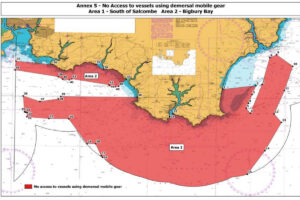
The Start Point to Plymouth Sound and Eddystone SAC, where the Stella Maris was accused of fishing illegally.
“From the failure of process relating to the original interview with the skipper under the Police and Criminal Evidence Act 1984, to the assumptions made in relying solely on VMS data – even to the extent of ignoring the statement of the responsible government minister and guidance from another court – to the immense costs to the public purse and so on, this has been a tragedy rather than a comedy of errors for the defendants.
“Having sat in the court this week and witnessed the effect that the case has had on the defendants, they have paid a heavy price in financial as well as emotional terms for the pain and suffering caused by the IFCA’s pursuit of a case that should have been thrown out six years ago.
“We can only hope that NUTFA’s calls for oversight of IFCA approaches to enforcement are now heeded. There are clearly questions for the Devon and Severn IFCA and their paymasters to answer with respect to the handling of this case and the use of public funds.”
The judge commented in relation to the prospect of a full trial lasting perhaps six days: “In my clear view, that would be a ludicrous way of expending tens of thousands of pounds.”
Jerry Percy added: “I really must pay tribute to not only to Jack and Chrissie for their fortitude in staying the course, but also importantly to Sarah Ready, my NUTFA colleague, who has doggedly pursued this case through to its successful conclusion, despite both a heavy workload with NUTFA and as a director of her own family fishing business.”
Rob Clark, chief executive of the Association of IFCAs, which represents all IFCAs in England other than D&SIFCA, which left the association a few years ago, told FN: “As an association, we will do our best to come together and learn from this, and in particular, that full medical disclosure early on in the case did not happen, but should have happened, an issue exacerbated by the huge delays and backlog in the legal system.
“It is important that as a group we sit down and reflect on lessons learned. In particular, that we recognise the severe pressures that many inshore fishermen are under, the strains on mental health that this can create, and the need for officers to be fully aware of this when undertaking their duties.”
As FN went to press, the D&SIFCA confirmed that it had received the written judgement, but had not had time to discuss the content with its legal advisors.
A spokesperson told FN: “D&SIFCA is in the process of reviewing HHJ Linford’s judgement, and does intend to make a public statement in response that will be shared with Fishing News as soon as we are in a position to do so.”
FN also contacted the MMO on the wider issue of its potential involvement in supporting a consistent approach to fisheries prosecutions for activities undertaken within the six-mile zone, but it declined to comment.
This story was taken from the latest issue of Fishing News. For more up-to-date and in-depth reports on the UK and Irish commercial fishing sector, subscribe to Fishing News here or buy the latest single issue for just £3.30 here.

